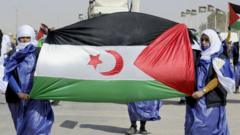The UK government has officially endorsed Morocco's autonomy plan for the disputed Western Sahara territory, a significant diplomatic shift after decades of neutrality. This support, articulated by UK Foreign Secretary David Lammy during his recent visit to Rabat, aligns with potential economic ventures tied to the forthcoming 2030 men's football World Cup, which Morocco is co-hosting with Spain and Portugal.
Historically, British governments have maintained a neutral position, regarding Western Sahara as a "non-self-governing territory" under UN oversight. Lammy characterized Morocco's proposal as "the most credible, viable and pragmatic basis for a lasting resolution" of the territorial conflict while signing a collaborative agreement set to enhance British investment in Moroccan infrastructure, particularly linked to World Cup projects.
The announcement has sparked controversy, especially from Algeria, which supports the Polisario Front's bid for full independence for the Sahrawi people. Algerian officials expressed disappointment, citing the long-standing nature of Morocco's plan and its lack of acceptance among the Sahrawi community.
Western Sahara, rich in minerals, has been a focus of conflict since the 1970s, escalating into a prolonged standoff involving Morocco and the Polisario Front. Although the region is recognized as an independent entity by the African Union, many countries, including the US and various European nations, have leaned in favor of Morocco's claims in recent years.
UK officials indicated that their support for Morocco's plan comes coupled with expectations of new negotiations and a revised autonomy proposal, emphasizing a commitment to respecting the principle of self-determination. The new procurement agreement is designed to facilitate British access to Moroccan public tenders, particularly in areas such as health and infrastructural upgrades.
The evolving political landscape around Western Sahara has implications beyond bilateral relations, marking a potentially pivotal moment in the ongoing conflict that has resisted resolution despite multiple ceasefires since the 1990s. The UN continues to oversee peacekeeping efforts, with a long-anticipated referendum on the territory's future yet to materialize.
In summary, this endorsement by the UK could have far-reaching consequences in the region, reflecting a significant shift in diplomatic alliances and a renewed focus on economic benefits linked to major international events.
Historically, British governments have maintained a neutral position, regarding Western Sahara as a "non-self-governing territory" under UN oversight. Lammy characterized Morocco's proposal as "the most credible, viable and pragmatic basis for a lasting resolution" of the territorial conflict while signing a collaborative agreement set to enhance British investment in Moroccan infrastructure, particularly linked to World Cup projects.
The announcement has sparked controversy, especially from Algeria, which supports the Polisario Front's bid for full independence for the Sahrawi people. Algerian officials expressed disappointment, citing the long-standing nature of Morocco's plan and its lack of acceptance among the Sahrawi community.
Western Sahara, rich in minerals, has been a focus of conflict since the 1970s, escalating into a prolonged standoff involving Morocco and the Polisario Front. Although the region is recognized as an independent entity by the African Union, many countries, including the US and various European nations, have leaned in favor of Morocco's claims in recent years.
UK officials indicated that their support for Morocco's plan comes coupled with expectations of new negotiations and a revised autonomy proposal, emphasizing a commitment to respecting the principle of self-determination. The new procurement agreement is designed to facilitate British access to Moroccan public tenders, particularly in areas such as health and infrastructural upgrades.
The evolving political landscape around Western Sahara has implications beyond bilateral relations, marking a potentially pivotal moment in the ongoing conflict that has resisted resolution despite multiple ceasefires since the 1990s. The UN continues to oversee peacekeeping efforts, with a long-anticipated referendum on the territory's future yet to materialize.
In summary, this endorsement by the UK could have far-reaching consequences in the region, reflecting a significant shift in diplomatic alliances and a renewed focus on economic benefits linked to major international events.






















